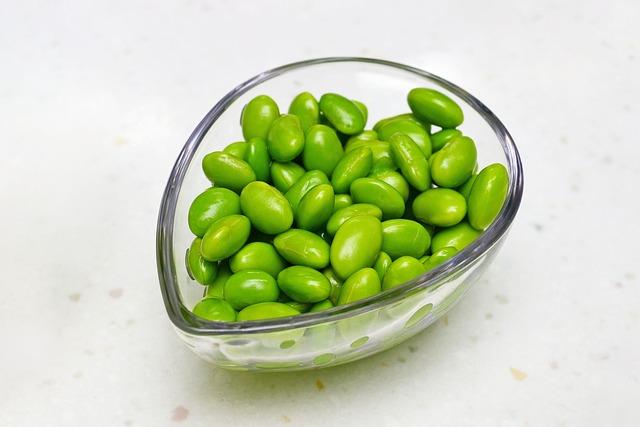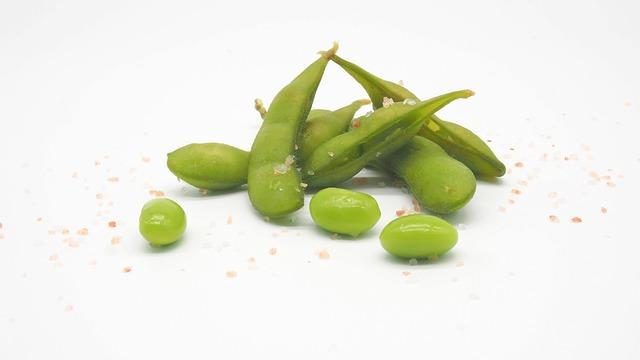Is Edamame Hard to Digest? The Soy Snack’s Stomach Story!
Have you ever wondered why some people find edamame hard to digest? We’re here to uncover the stomach story behind this popular soy snack. From its nutritional benefits to potential digestive challenges, let’s explore whether edamame is truly a friend or foe to your gut health.
Contents
- Is Edamame Difficult on the Digestive System?
- Benefits of Edamame for Digestion
- How to Reduce Digestive Discomfort from Edamame
- Tips for Enhancing Digestibility of Edamame
- Understanding the Stomach-Friendly Side of Edamame
- Balancing Edamame Consumption for Optimal Digestion
- The Truth About Edamame and Bloating
- Exploring Edamame’s Impact on Gut Health
- Making Edamame a Part of a Digestion-Friendly Diet
- Insights and Conclusions
Is Edamame Difficult on the Digestive System?
Edamame, the beloved soybean snack, has gained popularity for its delicious taste and numerous health benefits. While it is a nutritious choice packed with protein, fiber, and essential vitamins, some people may wonder if it is hard on their digestive system. Let’s take a closer look at how edamame affects the stomach:
<p>1. **High Fiber Content**: Edamame is rich in fiber, which can be beneficial for digestion by promoting regular bowel movements and preventing constipation. However, consuming too much fiber at once may cause bloating and gas in some individuals.</p>
<p>2. **Soy Protein**: Some people may have difficulty digesting soy protein found in edamame, leading to symptoms such as bloating, gas, or stomach discomfort. If you have a sensitivity to soy protein, it is best to consume edamame in moderation.</p>
Benefits of Edamame for Digestion
Edamame, the young soybean pods often enjoyed as a snack or appetizer, can actually be beneficial for digestion. Here’s how:
- High fiber content: Edamame is a good source of dietary fiber, which helps regulate digestion and promote regular bowel movements.
- Rich in protein: The protein in edamame can help keep you feeling full and satisfied, reducing the likelihood of overeating and supporting healthy digestion.
- Contains probiotics: Edamame is a source of beneficial bacteria that can support a healthy gut microbiome, leading to improved digestion and absorption of nutrients.
| Vitamin C | Boosts immune system |
| Iron | Supports healthy blood circulation |
So, next time you’re looking for a tasty and digestion-friendly snack, reach for some edamame and enjoy all the stomach-friendly benefits it has to offer!
How to Reduce Digestive Discomfort from Edamame
If you’re experiencing digestive discomfort from eating edamame, you’re not alone. This popular soy snack is known for causing bloating, gas, and other digestive issues in some individuals. The good news is that there are simple steps you can take to reduce these unpleasant symptoms and continue enjoying this tasty treat.
Here are some tips to help reduce digestive discomfort from edamame:
- Make sure to cook edamame thoroughly to make it easier to digest.
- Avoid eating edamame in large quantities, as overconsumption can lead to stomach upset.
- Try pairing edamame with foods that are easier on the stomach, such as brown rice or steamed vegetables.
If you love edamame but struggle with digestive issues after eating it, don’t worry. By following these simple tips, you can continue to enjoy this nutritious snack without the discomfort.
Tips for Enhancing Digestibility of Edamame
Edamame, also known as young soybeans, is loaded with essential nutrients like protein, fiber, and antioxidants. However, some people may find edamame hard to digest due to its high fiber content. If you experience bloating or gas after eating edamame, here are some tips to enhance its digestibility:
- Boil or steam edamame instead of eating it raw, as cooking can make it easier to digest.
- Chew edamame thoroughly to break down its fibers and aid in digestion.
- Pair edamame with digestive enzymes or probiotic-rich foods like yogurt to support gut health.
- Drink plenty of water while consuming edamame to help with the digestion process.
By following these tips, you can enjoy the nutritional benefits of edamame without experiencing digestive discomfort. Remember to listen to your body and adjust your edamame consumption based on your individual tolerance levels.
Understanding the Stomach-Friendly Side of Edamame
Edamame, often called “vegetable soybeans,” is a popular snack known for its nutritional benefits and unique taste. But what about its impact on digestion? Many people wonder if edamame is hard to digest, especially for those with sensitive stomachs. The good news is that edamame is actually quite stomach-friendly!
Here are some reasons why edamame is easy on the stomach:
- High Fiber Content: Edamame is rich in fiber, which can aid in digestion and promote overall gut health.
- Low in Fat: With a low fat content, edamame is gentle on the stomach and less likely to cause discomfort.
- Rich in Protein: The protein in edamame can help keep you feeling full and satisfied without weighing down your digestive system.
So next time you’re looking for a healthy snack that won’t upset your stomach, reach for some edamame and enjoy all the digestive benefits it has to offer!
Balancing Edamame Consumption for Optimal Digestion
Edamame is a nutritious and delicious snack that is popular for its high protein and fiber content. However, some people may experience digestive issues when consuming edamame due to its high fiber content. To ensure optimal digestion, it is important to balance your edamame consumption and make some simple adjustments to prevent any discomfort.
One way to improve digestion when eating edamame is to **drink plenty of water**. Fiber-rich foods like edamame can absorb water in your digestive tract, so staying hydrated can help prevent constipation and promote smooth digestion. Additionally, **chewing your edamame thoroughly** can aid in breaking down the fiber and other components, making it easier for your body to process.
Another tip for balancing edamame consumption is to **start with small portions** and gradually increase your intake. This can help your body acclimate to the fiber content and reduce the likelihood of bloating or gas. Additionally, **pairing edamame with other foods** that are easy to digest, such as leafy greens or rice, can help facilitate the digestion process and promote overall gut health.
The Truth About Edamame and Bloating
Edamame is a popular soy snack that many people enjoy, whether steamed, boiled, or roasted. However, some individuals may experience bloating or digestive discomfort after consuming edamame. So, what’s ? Let’s break it down.
One possible reason for bloating after eating edamame is its high fiber content. Fiber is essential for digestive health, but consuming too much fiber at once can lead to gas and bloating. Edamame is also a legume, which contains oligosaccharides that some people may have difficulty digesting.
However, it’s important to note that not everyone will experience bloating from eating edamame. If you find that edamame causes bloating for you, try eating smaller portions, chewing thoroughly, or pairing it with foods that aid digestion such as ginger or peppermint. As always, listening to your body and making adjustments based on how you feel is key to enjoying edamame without discomfort.
Exploring Edamame’s Impact on Gut Health
Edamame, the young, green soybeans that have become a popular snack choice, has been praised for its potential impact on gut health. Rich in fiber, protein, and various essential nutrients, edamame is believed to contribute to a healthy digestive system. Despite its many benefits, some individuals may experience digestive issues when consuming edamame due to its high fiber content.
**Here are some factors to consider regarding edamame’s impact on gut health:**
- Fiber content: Edamame is a good source of fiber, which can aid in digestion by promoting regular bowel movements and supporting a healthy gut microbiome.
- Protein source: As a plant-based protein, edamame can be easier to digest compared to animal proteins for some individuals.
- Individual tolerance: Like any food, the impact of edamame on gut health can vary from person to person. Some may find it easy to digest, while others may experience bloating or gas.
Making Edamame a Part of a Digestion-Friendly Diet
Edamame is a versatile and delicious snack that can be a great addition to a digestion-friendly diet. While some people may find edamame hard to digest due to its high fiber content, others may find it easy on the stomach. The key to incorporating edamame into your diet is to introduce it gradually and monitor how your body reacts.
Here are some tips for :
- Start with small portions and gradually increase your intake.
- Pair edamame with easily digestible foods like rice or quinoa.
- Experiment with different cooking methods – steaming, boiling, or roasting – to see which works best for you.
| Edamame Benefits for Digestion | Edamame Tips for Digestion |
|---|---|
| High in fiber | Introduce gradually |
| Rich in protein | Pair with easily digestible foods |
| Packed with vitamins and minerals | Experiment with cooking methods |
Insights and Conclusions
In conclusion, while edamame may be hard to digest for some individuals due to its high fiber content, it can still be a nutritious and delicious snack when enjoyed in moderation. If you experience digestive discomfort after eating edamame, try cooking it thoroughly or incorporating it into meals with other easily digestible foods. Remember, everyone’s digestion is unique, so listen to your body and make choices that work best for you. Don’t let digestive concerns hold you back from enjoying this protein-packed soy snack! Just be mindful of how much you’re consuming and how your body responds. Happy snacking!












